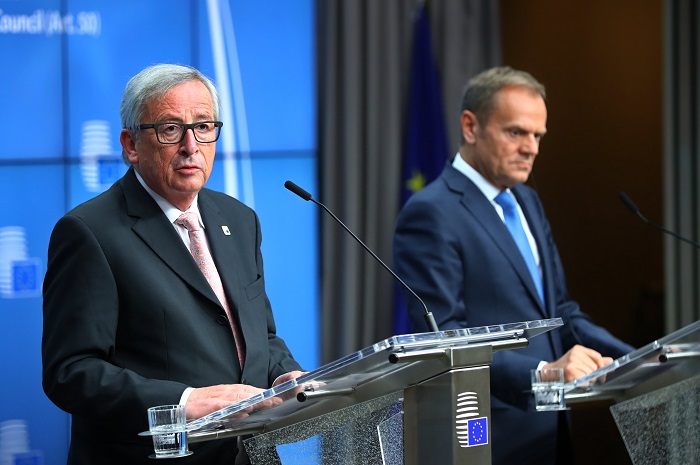EU to discuss crucial issues in complex Brexit talks
Published : 30 Apr 2017, 01:18

The European Union leaders endorsed a set of "divorce" terms for Britain at a summit in Brussels on Saturday, rejoicing in a show of unity.
While the agreement on the guidelines, or "red lines", for the upcoming Brexit talks has been reached, the bloc will face crucial issues in the coming negotiations.
"Unity in action," European Commission President Jean-Claude Juncker declared on Saturday as he announced the 27 EU governments adopted the negotiating strategy.
"Guidelines adopted unanimously. EU27 firm and fair political mandate for the Brexit talks is ready," European Council President Donald Tusk tweeted while EU leaders burst into applause when the guidelines were waved through.
Those will bind Michel Barnier, former EU commissioner and the EU's chief Brexit negotiator, to seek an agreement that secures the rights of 3 million EU expats living in Britain and ensure London pays tens of billions of euros Brussels thinks it will be owed.
One of the thorniest issues is the size of the divorce bill with EU officials estimating at 60 billion euros because of EU budget rules. British politicians have said the government will not pay a sum of that size.
Ireland is another potential obstacle to any deal. Britain will be reminded in the coming weeks to abide by the terms of the 1998 Good Friday Agreement.
EU leaders have also reiterated that they will rule out discussing the free trade deal May wants until they see what has been called "sufficient progress" on agreeing those key withdrawal terms.
In reaction to the summit outcome, Antonio Tajani, president of the European Parliament, said, "For Parliament, 'orderly withdrawal' means, above all, finding a quick solution to the problem of EU citizens resident in the UK and British citizens resident in the EU."
"There will be difficult moments. Unity will be our strength and our greatest asset. Our peoples (citizens) have placed their hopes in us. They are looking to us to defend their interests and to show that we are up to the task which we have been given,"Tajani said.
Tusk also commented, "We all want a close and strong future relationship with the UK. There's absolutely no question about it. But before discussing the future, we have to sort out our past. We will handle it with genuine care, but firmly. This is, I think, the only possible way to move forward."
Talks with Britain will now begin after British general election on June 8. The deadline for completing the negotiations is March 19 in 2019.
Crucial issues to be discussed now included what criteria they may use to judge whether the two sides have made "sufficient progress".
EU leaders may also talk about how to manage a transition, after Britain leaves in 2019, to a new relationship likely to take many more years to finalize.
Also contentious will be which countries scoop the prizes of hosting the European Medicines Agency (EMA) and the European Banking Authority (EBA), the two EU agencies set to be moved from London.
It is all a reminder that the real negotiating action over Brexit is just about to begin.

